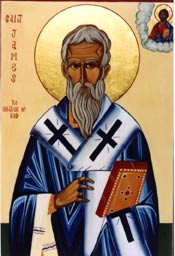
Briefly mentioned in New Testament passages, most notably 1Cor. 15:7 where Paul reports that he sees the risen Lord, James of Jerusalem is recognized as an early leader in the Church in Jerusalem. According to Galatians 2:9, Paul writes that James' mission is to the Jews.
...and when James and Cephas and John, who were acknowledged pillars, recognized the grace that had been given to me, they gave to Barnabas and me the right hand of fellowship, agreeing that we should go to the Gentiles and they to the circumcised...James is recognized as the first bishop of Jerusalem, the "Bishop of bishops." In Festivals and Commemorations, Rev. Philip Pfatteicher writes,
Jewish Christianity exalted him above Peter and Paul since his ministry was in the principal city of the Holy Land. He remained the most respected and authoritative leader in Jerusalem for most of the Christian generation, no doubt because of his eyewitness testimony to the risen Jesus.James is according to accounts put to death by temple authorities, just when remains the issue. Josephus says he was stoned to death in 62, but another source says that during Passover before the siege in 66, James claimed that Jesus was the Son of Man, and then that he was thrown from the temple, then stoned and beaten. Whenever it was, James' confession of Jesus as Messiah is the catalyst for his martyrdom.
Given recent discussions of Islamic martyrdom in media circles, martyrdom is generally seen as a negative reaction. Evidently one can take one's faith too far. Christian martyrs (remember martyr means "witness" or "one who gives testimony") are not active in seeking their own deaths let alone others. Christian martyrs proclaim Jesus as Lord and accept the consequences, even if others put them to death for their proclamation.
Does the Church now raise up people who would accept martyrdom? Perhaps the more important question to be raised first is, "Does the Church raise up people who may faithfully proclaim Jesus as Messiah in all things?" This proclamation is far from just talking Jesus, like the church group I saw this past weekend at a very popular state park. A short distance from the restrooms the group sat in a circle, and as my sons and I walked around waiting for my wife to finish in the restroom, the group broke into "Our God Is an Awesome God" and then into some warrior-type chant. "Give me a 'J.' Give me an 'E.'... What's that spell? JESUS! Who do you love? JESUS!...Who's coming back soon? JESUS!" Is that proclamation? More importantly is that proclamation worth dying for? Will it form a people to proclaim Jesus in such a way that others hate you for it?
Or is it safe proclamation? Set apart from the crowd, they circled up, sang their song, did their cheer, and felt good about what they said. Did it actively engage non-believers? Did they show the love that is to make us known to others? With martyrs, there is an active engagement of the political realm, with society (political not meaning just the civil authorities, but the life we live together in society). Most Christians I would say are formed now to be non-threatening to the political order. Christians are safe. If we appear to take the Gospe too seriously, we are labelled with terms like "radical" and "trouble maker."
James' engagement with the authorities of his time led to his death. The martyrs give us the example about how we proclaim the gospel extravagantly and without reserve. Let us give thanks for all who are formed in that way, and pray that we may be formed the same.
Peace.
No comments:
Post a Comment